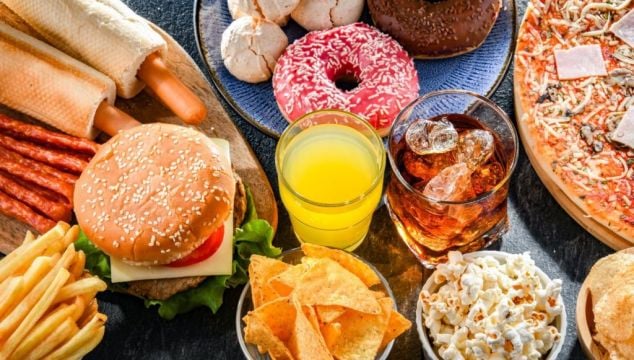Ultra-processed foods (UPFs), alcohol, tobacco and fossil fuels are killing up to 2.7 million people each year across Europe, a new World Health Organisation report suggests.
According to the report, “more than 7,400 people are dying every day” due to “powerful industries” driving ill health with harmful products and practices.
The data showed that in Europe each year, 1.15 million deaths are a result of smoking, 426,857 by alcohol, 117,290 by diets high in processed meats and 252,187 by diets high in salt.
The WHO also called for “strict regulation to curb industry power” and for those in political power to actively push for health policies that are regularly “challenged, delayed, weakened or stopped” by the commercial industry.

They added: “These commercial products contribute to 24 per cent of all deaths, including significant mortality from cardiovascular diseases (51.4 per cent) and cancer (46.4 per cent).”
So what exactly are ultra-processed foods and how can you avoid them? Health experts share everything you need to know.
What are ultra-processed foods?
For registered nutritionist and author Jenna Hope, ultra-processed foods are foods that are industrially produced on a mass scale and contain added ingredients such as colourings, emulsifiers and additives.
“They’re often made to be hyper-palatable through the addition of fats and sugars and the end product often looks nothing like its original source,” said Hope.
“Commonly consumed ultra-processed foods include chips, burgers, soft drinks, chicken nuggets, some cereals, sweets, biscuits, processed meats and meat alternatives, and even some heavily processed cheeses.”
Rob Hobson, registered nutritionist and author of Unprocess Your Life, agreed and added: “These foods also have a long shelf life and are manufactured to be convenient, cheap, and hyper-palatable, which means they are easy to over-consume. They are typically low in fibre and other essential nutrients, but high in saturated fat, sugar and salt.
“You don’t have to cut UPFs out of your diet completely – it’s not very realistic to be able to do that, and to be honest, to be in that situation would be a privilege – having the time and money to cook everything from scratch!”
But the ones to cut back on are the usual suspects like crisps, chocolate, biscuits, pizza, and ice cream, said Hobson.
“If you can cook food from scratch then that is always going to be a better option than something ready prepared which can contain a lot of additives. But this also depends on the costs of the product, as the cheaper ones tend to contain more additives, as these ingredients are often used to retain the texture and taste when you take other whole ingredients out or reduce them to keep the cost down.

“New research published in The Lancet this week has suggested that plant-based UPFs are just as bad, even though they are marketed as being healthy alternatives, but this is dependent on the degree of processing involved and food additives used much the same as animal-based products.”
How do they impact your body?
Ultra-processed foods often contain high quantities of saturated fats and sugars, which when over consumed can contribute to a risk of cardiovascular disease, type 2 diabetes and weight gain.
“The processing methods often degrade much of the nutritional content that may have been found in the original ingredients. Additionally, ultra-processed foods are believed to be less satiating than whole foods due to lower fibre contents and higher impacts on blood glucose levels,” said Hope.
“As a result, individuals with a diet based around ultra-processed foods may be more likely to over consume on energy from these foods. Moreover, the processing methods of ultra-processed foods can often contribute to the degradation of nutrients which may have initially been present in the foods.
“Some additives such as emulsifiers which are often present in UPFs have also been shown to contribute to damaging the gut lining, which can impair nutrient absorption and increase the risk of gut disorders.”
What are the healthy alternatives?
Hobson thinks that a lot of the UPFs taste pretty bad. So it’s easy to find alternatives that taste good.
“Replace fizzy drinks with infused water, herbal teas or additive-free drinks,” he first suggested.
“Choose homemade vegetable crisps or nuts and seeds instead of flavoured crisps. Opt for freshly made bread from a bakery or homemade wholemeal bread over mass-produced packaged bread with a long shelf life if your food budget permits.
“Prepare homemade versions of ready meals and takeaways. Swap sugary breakfast cereals with homemade granola.

“Switch fruit yoghurts for plain yoghurt with fresh fruit, or make a compote with frozen fruit and a little honey thrown in the pan. Make snack bars at home using dried fruit, nuts, and oats.”
How can people have a more balanced diet?
According to Suzie Sawyer, a nutritionist at Biotiful Gut Health, people need to get into better habits by cooking from scratch rather than buying ready meals.
“As a nutritionist, I hear many people saying they haven’t got time to cook, but you can chop up a few veggies, grill a piece of chicken or salmon and enjoy a meal within about 15 minutes – no longer than it takes or order from an app or read a label and put in the microwave. Keeping it simple is fine – no one needs to be a Master Chef!” she said.
Hope added: “Additionally, try to limit the number of takeaways you’re ordering. Where possible, opt for whole food-based snacks such as an apple and peanut butter, boiled eggs, a handful of nuts or yoghurt with fruit.”
How can people improve their relationship with food?
For Sawyer, it’s all about understanding that food is not just for energy but it’s the cornerstone of health too.
“Every single vitamin and mineral has many jobs (some as many as 300!) in keeping our biochemistry working as it should, maintaining good health and protecting future longevity,” she said.
“Maybe people can create little family challenges to eat meals where the foods are as near to nature intended as possible. Once people start to notice improvements in health, especially energy levels, then habits can change.”







